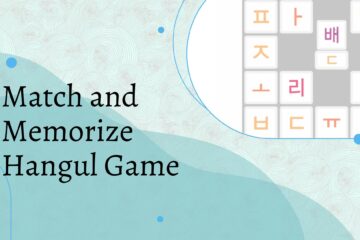Tea is a classic drink with a long history, and Korea is no exception. Today I’ll dive a bit into the drink with vocab for the different kinds of tea in Korean, Korea’s culture and history with tea, some Sino-Korean, and more.
Korea has a rich tea history and culture that goes back over 2000 years! So I won’t be going fully in-depth on it all, but it will be just a nice overview to introduce the culture a bit.

Short Introduction on Tea in Korea
A lot of Koreans love tea, from classic green tea to lotus, barley, and more. Being neighbors to China with their own heavily rich tea culture, of course, Korea ended up adapting and developing its own. Around the Sila Dynasty in the 800s, people adapted the practice and started growing their own tea bushes. It became popular to have at ceremonies and as gifts with family and friends, ancestors during ancestral rites, and to offer to the Buddha.
Tea is typically grown in the southern part of South Korea, with a few key places being well-known for their teas, including Boseong, Hadong, Jeju Island, and the Jirisan region. Boseong is known as the tea capital of Korea, producing almost 40% of Korea’s tea production! The large fields are a tourist attraction, which draws in people looking to buy matcha (fine ground green tea) and tea products.
Teas produced in Korea are said to be lighter and sweeter. Some add persimmon leaves, ginger, and the well-known ginseng, with a focus on health benefits and being natural. Barley tea especially, is common in daily life; both in houses and restaurants, served hot or cold.
Korean Word for Tea Originates from Sino-Korean!
Tea in Korean, or 차, comes from 茶 the hanja for tea. You’ll see 차 everywhere in this post, so instead of a section dedicated to just 차 words, keep an eye out for it as I organize the vocabulary.

Different Types of Tea in Korea
Here are some of the local teas that are grown in Korea and a little about them!
- 녹차: Green tea
- green tea is one of Korea’s most traditional and popular teas
- 보리차: Barley tea
- made from roasted barley, it can be served hot or cold
- 옥수수차: Corn tea
- brewed with roasted corn kernels, the tea is popular hot in winter. also served in restaurants alike barley tea
- 유자차: Citron tea
- made from yuzu fruit, this tea is used to help fight colds during winter
- 대추차: Jujube tea
- made from Korean dates, this tea is sweeter and soothing
- 생강차: Ginger tea
- a classic often paired with honey to make it sweeter. I know I like it when I’m feeling a bit sick, also with a good amount of honey for my throat
- 쌍화차: Ssanghwa tea
- traditional tea, made from a blend of medicinal herbs; drank for good health
- 오미자차: Five-Flavor tea
- specialty tea, which has elements of sweet, sour, salty, bitter, and spicy flavors.
- 인삼차: Ginseng tea
- a favorite of mine! Made directly with ginseng root (pictured above) or with a powdered form, this tea is touted as being a huge health benefit.
- 매실차: Plum tea
- brewed from fermented plums, it has a slightly tangy and refreshing flavor
- 국화차: Chrysanthemum tea
- floral tea made from chrysanthemum, often said to be calming
- 연잎차: Lotus leaf tea
- focusses on detoxing, using the leaves of the lotus plant for this tea
- 감잎차: Persimmon leaf tea
- known for its high vitamin C content, it’s made from dried persimmon leaves.
More Tea in Korean!
홍차: black tea
댓잎차: bamboo leaf tea
현미차: brown rice tea
메밀차: buckwheat tea
쑥차: mugwort tea
솔잎차: pine leaf tea
연근차: lotus root tea
버섯차: mushroom tea
계화차: cinnamon flower tea
귤화차: citrus flower tea
매화차: plum flower tea
석류차: pomegranate tea
호박차: pumpkin tea
도화차: peach flower tea
구기자차: goji tea
밀크 티: milk tea
버블티: bubble tea
아이스 티: ice tea
차이 티: chai tea
말차: matcha

Extra Related Vocabulary
카페인: caffeinated
디카페인: decaffeinated
꿀: honey
설탕: sugar
우유: milk
뜨거운 차: hot tea
주전자: kettle
티백: tea bag
찻잎: tea leaf
찻잔: teacup
카페: cafe
컵: cup
머그잔: mug
Cultural Vocab
차례: ancestral rite
다례: tea rite (proper etiquette for tea)
다회: tea meetings
다시: tea poetry
전통차: traditional tea
Example Sentences!
차 한 잔 드릴까요?: Would you like a cup of tea?
어제 버블티를 마셨어요: I had bubble tea yesterday
제가 좋아하는 차는 인삼차이에요: My favorite tea is ginseng tea
저는 커피 말고 차만 마셔요: I only drink tea, not coffee



0 Comments